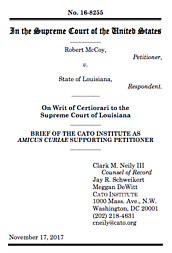Learn more about Cato’s Amicus Briefs Program.
Criminal defense is personal business. A criminal defendant may never face a more momentous occasion than his trial, nor one where his decisions have greater personal consequence. For this reason, the Constitution not only mandates rights for the accused, but also secures a defendant’s autonomy in the exercise of those rights: “The Sixth Amendment does not provide merely that a defense shall be made for the accused; it grants to the accused personally the right to make his defense.” Faretta v. California, 422 U.S. 806, 819 (1975). Robert McCoy sought to exercise his autonomy on one of the most fundamental decisions a defendant can possibly make—whether to admit or deny his own guilt before a jury. On trial for his life, McCoy made an informed, intelligent, and timely decision to maintain his innocence and put the state to its burden. But that decision was not respected. Over McCoy’s express objection, the trial court permitted his attorney, Larry English, to tell the jury that McCoy was guilty of murder. With the court’s approval, English even purported to relieve the state of its burden to prove McCoy guilty of murder beyond a reasonable doubt. Following this brazen violation of McCoy’s autonomy, the jury returned a unanimous verdict for first degree murder, and sentenced McCoy to death. The Louisiana Supreme Court upheld McCoy’s conviction, and effectively treated his insistence on deciding for himself whether to admit or deny guilt as a claim for ineffective assistance of counsel. But that framing elides the fundamental interest at issue here. In a capital case with overwhelming evidence, it may be tactically advantageous to admit guilt, with the hope of avoiding the death penalty at the sentencing phase. But the issue is not whether such a strategy is reasonable; it is whether a mentally competent defendant, fully informed of his situation, may decide for himself whether to maintain innocence and demand the state prove his guilt beyond a reasonable doubt. Once a defendant has chosen to be represented by counsel, his attorney has the power to make many binding decisions of trial strategy. But admitting guilt over a client’s express objection is much more than a mere strategic decision; it strikes at the very purpose of a jury trial—the adjudication of guilt—and eviscerates the defendant’s prerogative to decide upon the objectives of representation by counsel. A criminal justice system built upon the presumption of innocence, with ample procedural protections for the accused to put the state to its burden, becomes a process in which an admission of guilt is forced upon a presumptively innocent defendant without his consent. Beyond the defendant’s personal interest, failure to respect defendant autonomy damages the criminal justice system as a whole. McCoy’s trial reflected the gross spectacle of a divided defense—where the defendant must interrupt and object to his own lawyer’s presentation, and is then impeached by his own counsel under cross-examination. Such a presentation to the jury threatens the adversarial system itself, and undermines public confidence in the fair administration of justice. Adopting the government’s position would also put defense counsel in impossible ethical dilemmas and encourage more defendants to proceed pro se, even if they otherwise would have welcomed the assistance of counsel. The defendant, his lawyer, and the system as a whole will all be best served by a clear decision protecting the defendant’s autonomy.

This work is licensed under a Creative Commons Attribution-NonCommercial-ShareAlike 4.0 International License.



